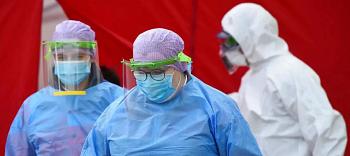‘Grave concerns’ about Covid-19 immunity passports
Trapped between the competing urgencies of saving lives from Covid-19 and avoiding economic calamity, some government officials have mooted “immunity passports” as a way through the impasse. But experts told FRANCE 24 that the necessary antibody testing is not reliable enough – and even if the scheme were feasible, it could create a dangerous incentive for some to acquire the virus in order to qualify for the passport.
The global tally of confirmed coronavirus cases surpassed 2 million on Wednesday – a day after researchers at the Harvard School of Public Health warned that the US may need to keep some social distancing measures until 2022, while the IMF predicted that, thanks to “the Great Lockdown”, the world will suffer the worst recession since the Great Depression.
Anxious about both the unfolding economic disaster and the risk of Covid-19 resurging if lockdowns are reversed prematurely, some officials in hard-hit countries have suggested that a system of immunity passports could be a route out of the coronavirus crisis – for some at least. The idea is that people who have already had the disease and thereby gained immunity could be given permits to live their lives mostly like they did before the pandemic.
Shortly after emerging from self-isolation after testing positive for Covid-19, the UK’s Health Secretary Matt Hancock announced in early April that the British government was considering an “immunity certificate” system to allow those who qualify to “get back as much as possible to normal life”.
Paris Mayor Anne Hidalgo has also given the idea her backing – putting it in a list of proposals for returning to business as usual in the City of Lights that she sent to the French government. On the other side of the Atlantic, Anthony Fauci, the director of the US National Institute of Allergy and Infectious Diseases, told CNN that immunity passports are “being discussed” in the Trump administration. “It might actually have some merit under some circumstances,” he added.
Antibody tests ‘not sufficiently accurate’
Immunity passports would require tests for antibodies specific to Covid-19, which would be different from those used to discern whether or not people currently have the virus. The problem is that, as things stand, these tests “are not sufficiently accurate for individual immunity passports”, which means that “we are still a long way off it being useful to test individuals with these methods”, said Claire Standley, an assistant professor at Georgetown University’s Center for Global Health Science and Security.
A major reason why such tests look likely to be ineffective, Standley explained, is that they do not seem specific enough to avoid mistaking a similar virus for Covid-19: “There may be cross-reactivity between the antibodies for SARS-CoV-2 [Covid-19] and other circulating coronaviruses – including those that cause common colds – meaning a positive result might not indicate past exposure to SARS-CoV-2 but maybe another coronavirus instead.”
As well as flagging up people who have recovered from ailments that merely seem similar to Covid-19, Standley said these tests also have a problem in failing to detect some people who have experienced a minor form of the virus: “High false negative rates (lack of sensitivity) of the test mean that those currently available are not recommended for patient-level clinical diagnosis; unless the sensitivity improves, these tests may also not be effective in identifying people who have recovered from mild cases of Covid-19, and thus may have lower levels of antibodies in their blood.”





